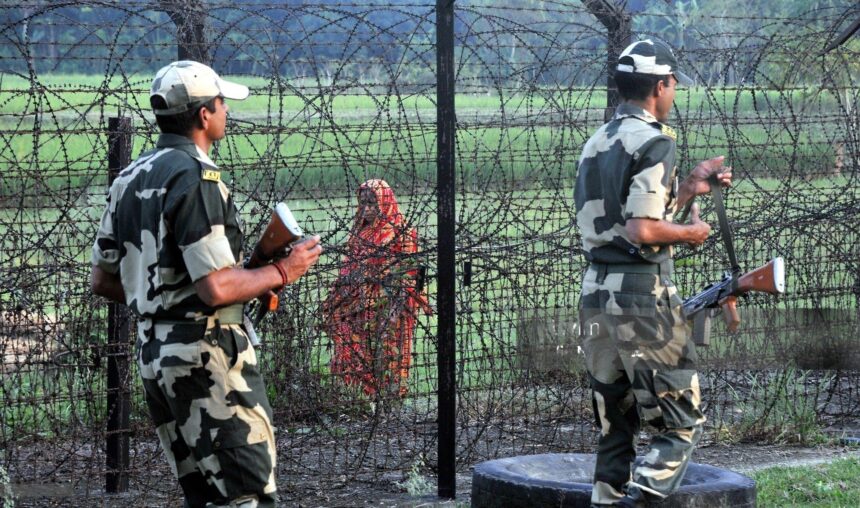In recent months, Tripura has witnessed an alarming surge in Bangladeshi infiltration, raising significant concerns about the security and stability of the region. According to collective reports from May and June, 105 individuals have been apprehended by various security forces, including the Government Railway Police (GRP), Border Security Force (BSF), Rapid Action Force (RAF), and others. The situation escalated further in July, with more than 50 illegal entrants reported, highlighting the ongoing challenge for authorities.
Increased Infiltration in July
a womanThe month of July marked a particularly intense period of infiltration. On July 1st, the Railway Police arrested 16 Bangladeshis at Agartala Station as they attempted to sneak into other parts of India. Just days later, on July 12th, another 14 individuals, including a minor and women, were apprehended. The trend continued, and on July 26th, two more suspects were caught. The most significant operation occurred on July 28th, when a joint effort by the GRP, BSF, and other security forces led to the arrest of 23 Bangladeshis under the Passport Act, BNS Act, and various other charges.
Concerns of Indigenous Tribes and Unemployed Youth
The infiltration crisis has stirred significant tension among Tripura’s indigenous tribes, who fear that the increasing number of Bangladeshis threatens their culture, heritage, and language. The state’s unemployed youth also express growing concerns about heightened competition for scarce job opportunities, with many fearing that the influx of Bangladeshis will further strain the already limited employment prospects in this small state.
Challenges of Border Security
Tripura’s geographical location, with the state almost entirely surrounded by Bangladesh, makes it particularly vulnerable to infiltration. The porous nature of the international border, riddled with gaps and insufficient security, facilitates easy passage for infiltrators. This is compounded by interstate links that aid infiltration, along with human trafficking and drug smuggling that add complexity to the issue.
The lack of sufficient border security personnel exacerbates the problem, as highlighted by BSF DGP S.K. Sinha. Many officers are deployed in other states for election duties, leaving gaps in border coverage. Addressing this issue requires immediate steps, such as the installation of surveillance cameras and the adoption of digital AI-augmented systems to monitor and secure the borders effectively.
Government Response and Future Steps
Chief Minister Manik Saha has expressed deep concern over the infiltration issue, acknowledging the fears of the locals. In a meeting held on July 5th with security forces, the Chief Minister addressed not only the problem of infiltration but also the related issues of drug trafficking and human trafficking. CM Saha has assured the public of his full faith in the border security forces and their ability to tackle this growing menace.
DGP S.K. Sinha echoed the Chief Minister’s sentiments, stressing the urgent need to bolster border security to prevent further infiltration and protect the state’s socio-economic fabric. With the situation escalating, there is a clear necessity for comprehensive strategies and enhanced security measures to address the infiltration crisis effectively.
Impact on Socio-Economic Fabric
The increasing infiltration of Bangladeshis into Tripura not only poses security threats but also impacts the socio-economic dynamics of the state. Local businesses and communities express concerns about potential disruptions and cultural shifts due to the rising number of illegal entrants. The need for a balanced approach that considers both security measures and community concerns is crucial in maintaining harmony and stability in the region.
The Way Forward
Tripura’s government and security forces are at a critical juncture in addressing the infiltration crisis. With enhanced surveillance, international cooperation, and community engagement, there is hope for a more secure and stable future for the state. As the situation unfolds, the resilience and determination of Tripura’s people and authorities will play a pivotal role in overcoming these challenges and safeguarding the state’s interests.
FAQs
What is causing the rise in Bangladeshi infiltration in Tripura?
The porous nature of Tripura’s borders with Bangladesh, combined with insufficient security measures, facilitates easy passage for infiltrators. Additionally, interstate links, human trafficking, and drug smuggling contribute to the complexity of the issue.
How many Bangladeshis have been apprehended in Tripura recently?
Collective reports from May and June indicate 105 individuals have been apprehended. In July alone, more than 50 illegal entrants were reported.
What are the concerns of indigenous tribes in Tripura regarding this infiltration?
Indigenous tribes fear that the increasing number of Bangladeshis threatens their culture, heritage, and language, potentially leading to an imbalance in the region.
How is the government addressing the infiltration issue?
The government is focusing on bolstering border security through enhanced surveillance, the adoption of digital AI-augmented systems, and increased international cooperation. Chief Minister Manik Saha has expressed his full faith in the border security forces to tackle the crisis.
What role does the BSF play in controlling infiltration?
The BSF plays a crucial role in securing the borders and apprehending infiltrators. However, the lack of sufficient border security personnel, due to deployment in other states for election duties, has posed challenges in effectively controlling infiltration.
What are the socio-economic impacts of Bangladeshi infiltration in Tripura?
The infiltration poses security threats and impacts the socio-economic dynamics of the state, causing concerns about potential disruptions and cultural shifts in local communities.
Source: Homchong










